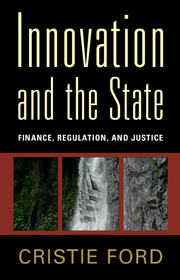The Cambridge Handbook of Twin Peaks Financial Regulation
Part of Cambridge Law Handbooks
- Editors:
- Andrew Godwin, Melbourne Law School
- Andrew Schmulow, University of Wollongong, Australia
- Date Published: June 2023
- availability: Available
- format: Paperback
- isbn: 9781009295680
Paperback
Other available formats:
Hardback, eBook
Looking for an inspection copy?
Please email [email protected] to enquire about an inspection copy of this book
-
First proposed in 1994, the Twin Peaks model of financial system regulation employs two specialist peak regulators: one charged with the maintenance of financial system stability, and the other with market conduct and consumer protection. This volume, with contributions from over thirty scholars and senior regulators, provides an in-depth analysis of the similarities and differences in the Twin Peaks regimes that have been adopted around the world. Chapters examine the strengths and weaknesses of the model, provide lessons from Australia (the first to adopt the model), and offer a comparative look at the potential suitability of the model in leading non-Twin Peaks jurisdictions. A key resource for central bankers, public policy analysts, lawyers, economists, politicians, academics and students, this work provides readers with a comprehensive understanding of the Twin Peaks model, and a roadmap for countries considering its adoption.
Read more- Provides a detailed examination of regulatory theory as it informs financial regulation architecture
- Informs the debates and scholarship developing in Twin Peaks theory and practice
- Addresses both the theoretical and practical implementation aspects of Twin Peaks adoption
Reviews & endorsements
'This book provides, for the first time, a comprehensive analysis of the 'twin peaks' model of financial regulation across multiple jurisdictions, drawing on insights from academics and regulatory practitioners to explore the important question of how the architecture of financial regulation should be organised in order to best achieve its multiple objectives.' Julia Black, CBE, FBA, author of Rules and Regulators
See more reviews'Twin Peaks is a division of regulatory responsibilities first substantially implemented in Australia and now proving increasingly popular around the world. This handbook assembles many leading regulatory scholars to analyse its rise and chart its potential future course. I commend this important contribution to all who are interested in how banking and finance might better be regulated.' Ross Buckley, KPMG-KWM Professor of Disruptive Innovation, UNSW Sydney
Customer reviews
Not yet reviewed
Be the first to review
Review was not posted due to profanity
×Product details
- Date Published: June 2023
- format: Paperback
- isbn: 9781009295680
- length: 385 pages
- dimensions: 255 x 175 x 20 mm
- weight: 0.721kg
- availability: Available
Table of Contents
1. Introduction: the genealogy and topography of Twin Peaks Andrew Godwin and Andrew Schmulow
2. The three episodes of Twin Peaks Michael W. Taylor
3. Reflections on twenty years of regulation under Twin Peaks Jeffrey Carmichael
4. Twin Peaks and central banks: economics, political economy and comparative analysis Donato Masciandaro and Davide Romelli
5. Twin Peaks in Australia – the never-ending trek? Andrew Godwin, Ian Ramsay and Andrew D. Schmulow
6. Twin Peaks financial regulation in New Zealand Helen Dervan and Simon Jensen
7. Identifying lessons and best practices for the Twin Peaks model Marco van Hengel, Olaf Sleijpen and Femke de Vries
8. Twin Peaks in South Africa Roy Havemann
9. The role of the SARB as central bank in the South African Twin Peaks model Corlia van Heerden and Gerda van Niekerk
10. Can the Twin Peaks model of financial regulation serve as a model for Israel? Ruth Plato-Shinar
11. Towards a Twin Peak regulatory architecture for Hong Kong? Douglas W. Arner, Evan Gibson and Janos Barberis
12. Regulatory structure and the revolving door phenomenon in South Korea: evidence from the 2011 Savings bank crisis Youkyung Huh and Hongjoo Jung
13. China: Considering elements of Twin Peaks to upgrade its financial regulation Li Guo and Jessica Cheung
14. Financial regulatory structure in China: challenges and transitioning to Twin Peaks Robin Hui Huang
15. US financial regulatory structure: beneath the surface of Twin Peaks Heidi Mandanis Schooner
16. A 'Twin Peaks' vision for Europe Dirk Schoenmaker and Nicolas Véron
17. A complex European financial architecture – ten years on Karel Lannoo
18. Twin Peaks and boiling frogs: consumer protection in one or two ponds? Gail Pearson
19. Twin Peaks – how should Macro-cultures be regulated? Patrick McConnell
20. Twin Peaks, macroprudential regulation and systemic financial stability Andrew Godwin, Steve Kourabas and Ian Ramsay.
Sorry, this resource is locked
Please register or sign in to request access. If you are having problems accessing these resources please email [email protected]
Register Sign in» Proceed
You are now leaving the Cambridge University Press website. Your eBook purchase and download will be completed by our partner www.ebooks.com. Please see the permission section of the www.ebooks.com catalogue page for details of the print & copy limits on our eBooks.
Continue ×Are you sure you want to delete your account?
This cannot be undone.
Thank you for your feedback which will help us improve our service.
If you requested a response, we will make sure to get back to you shortly.
×




